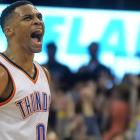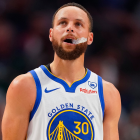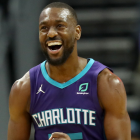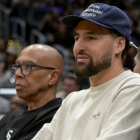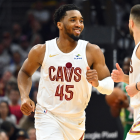Download the CBS Sports App today and get instant NBA scores, news and alerts, plus get the latest picks throughout the playoffs from SportsLine.
What you are about to read is not an argument that Russell Westbrook shouldn’t win MVP. That’s insane.
You can argue all you want that other players are more worthy. Kawhi Leonard might be having the best two-way season since Michael Jordan, or at least prime LeBron James. James Harden is having a legendary season, guiding the Rockets to the third seed in the West and averaging 29 points, 11 assists and eight rebounds. James, the King himself, is having a career season in terms of assists and rebounds for the best team in the Eastern Conference.
But despite all that, you can’t argue Westbrook doesn’t deserve it. He’s on pace to average a triple double -- the first player to do so since Oscar Robertson -- and doing it while leading the league in scoring. That’s unheard of. That’s crazy to even say. If I had said “a player will average a triple-double while leading the league in scoring” last summer, you would have said, “Oh, they’re the MVP, what are we talking about? Let’s go get snacks instead of even debating this.”
Westbrook has at least as much of a claim to the award as any of those other guys. However, he does not need the MVP.
Future history
Let’s say Leonard wins the award, which, given the nature of the scoring system, which awards 10 points to first place, five points to second place and three points to third, isn’t a ludicrous idea. Leonard is well-regarded by players and coaches, he has helped take the Spurs to the second seed in the Western Conference and another likely 60-win season. If that happened, there would be gnashing of teeth and torches flung through the air by those for whom Westbrook’s statistical accomplishment -- with this Thunder team, after losing Kevin Durant -- makes the answer to the MVP question obvious.
But here’s the thing. Westbrook’s season is historic. No one has done what he is doing, and that fact will stand longer than the MVP. When we look back and talk about this season, there will be a lot to chew through. Harden has two 50-point triple-doubles, and the most 40-point triple-doubles in a single season. Or how Durant would have been in the running for MVP along with his two former Thunder teammates if he hadn’t been injured. Or Leonard’s brilliant efficiency.
But the first thing most people will remember about this season will be Westbrook. In 20 years, they’ll say “Oh, that was the year Westbrook averaged a triple-double.”
And someone will say “Hey, didn’t he lead the league in scoring?”
“No way, no one could do that.”
“No, it’s true. Look it up on your holographic space phone!”
And then they’ll both get distracted complaining about the cell phone signal on Mars.
Westbrook’s season is the one we’ll remember, at least for the regular season. Harden, Leonard and James might, and likely will, have better playoff runs. But their regular seasons require context, nuance and exploration to really appreciate. Harden being second in points and first in assists is crazy. But that phrase, that weird, subjectively superior concept, the triple-double, changes everything.
3X2
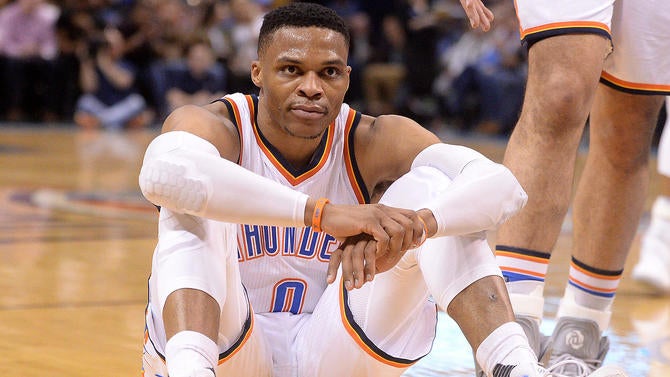
There is an argument to be made that a triple-double is inherently overrated. After all, is 20-11-9 really worse than 18-10-10? Harden averages more assists, and just two fewer rebounds. We know, from data, that most of those rebounds are uncontested. Even if you factor for how the Thunder build their system so their bigs block out and enable Westbrook to get the rebound, or how those rebounds help him get out in space, he’s only grabbing two more rebounds per game than Harden. Are two uncontested rebounds really the difference in greatness?
Then, there is the idea that Westbrook chases those numbers, to the detriment of his team, but the Thunder are 29-6 when he records a triple-double this season and are 12-24 in all other games. The Rockets are 15-4 when Harden has a triple-double, 34-18 in all other games.
Westbrook has 10.3 rebounds per game, but only two of those are considered “contested” by NBA.com’s tracking data. There’s ample evidence that the Thunder clear out to let him grab boards which would otherwise be contested, but that’s still a number that bothers folks.
So what makes 18-10-10 better than 20-11-9, really? I don’t know, but that question is worth discussing while we also acknowledge that no matter what, the triple-double is considered greater. It has always held power as a statistical mark in the NBA. That figure will stand the test of time in a way that other statistical marks won’t.
Enduring legend
Westbrook is doing things no one has ever done. That accomplishment doesn’t need a trophy to validate what he has done. If another player wins the award, it’s that player whose terrific season will slip backward into “the guy who won MVP the year that Westbrook averaged a triple-double [while leading the league in scoring].” James is in no risk of fading into obscurity, nor are Harden or Leonard.
They’re all having legendary seasons. But what Westbrook is doing will be referenced over and over again for years to come, in a meaningful way -- no matter who takes the trophy when it’s announced this spring.
But what if he doesn’t average a triple-double? What if he averages 29 points, 10 assists and only 9.5 rebounds? Not only will his MVP odds drop, but so will his chances of people remembering what he accomplished. That’s how arbitrary and important the triple-double is. A half-rebound less per game and Westbrook’s season goes from legend to near-legend -- despite his effort, production and impact being almost entirely the same.
Westbrook is likely to get there. And if he does, his will be the season we talk about first. That doesn’t mean he is the MVP -- that’s a more complicated question. But if he doesn’t win, you also shouldn’t lose your mind over it. Because history is going to validate what Westbrook did this season, MVP or not.









